by Jorge Patacas
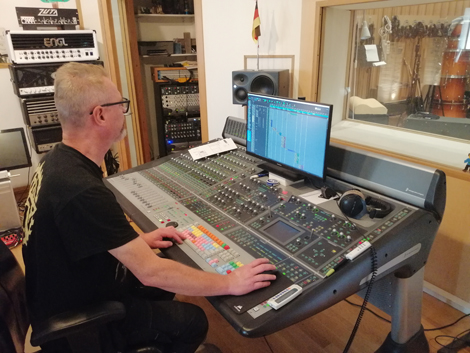
One of the key persons of the early Melodic Death Metal scene from Gothenburg, Sweden was the producer Fredrik Nordström. He has worked with bands like In Flames, Dark Tranquillity and At the Gates, responsible for what is known today as the “Gothenburg Sound”, and has also produced albums for Arch Enemy, Dimmu Borgir, Hammerfall, Soilwork, The Haunted and many others at his Studio Fredman which he runs since 1990. Besides being a legendary producer, he’s also a musician himself and has been playing guitar for the band Dream Evil since 1999. RISE! had the chance to visit Studio Fredman and conduct a long interview with Nordström where we went through his long career as a producer and musician. It’s one for the books. Enjoy!
RISE!: – I would like to start with the early days of your career. Back in the day you were playing pop music and then you met the guys from Ceremonial Oath in a rehearsal place…
Fredrik Nordström: Yes, we shared the same rehearsal place.
R!: – When did this happen?
FN: Editor’s Note: he thinks for a few seconds. That was in the early 90’s.
R!: – So that’s how you got into metal?
FN: First I was totally into pop music. Then I heard from a friend that a band needed a keyboard player and I knew how to play both keyboards and guitar, but then I was more into playing keyboards, so I joined the band as a keyboard player. We were playing kind of heavy metal/rock music. We rehearsed two hours two times a week at this rehearsal place and before us the Ceremonial Oath guys were rehearsing. For some reason, one day I came too early to the rehearsal, heard those guys playing and went “what the fuck is going on in there?”, so I put the keys and opened up, and Oscar Dronjak (guitar/vocals) and the other guys were standing there playing and he’s like (Editor’s note: he does harsh vocals) and I’m like “what the fuck is this?” (laughs)
R!: – It was completely new to you (laughs)
FN: Yeah, it was completely new for me. When the other guys in the band came and I said “have you heard what they’re doing in there?”, they told me they knew and that it was called death metal. And I was like “what’s that? It sounds kind of terrible!”, so they explained it was a new thing. Then since all these bands shared the same rehearsal room, we had meetings from time to time, and then on one of those meetings, Oscar said “we’ve got the record deal!”. And I was like “what!?” (laughs). They were planning to go to a really expensive studio in Gothenburg and since I just had started the studio, I went to him and said “hey, why don’t you come and check out our studio? You will get more time there than in the expensive studio”, so they came to the studio, thought it was fine and said “let’s record an album”. To be honest, I didn’t know what was going on in the whole recording. I just saw them moving their fingers and thought “what the fuck?”. When I remixed that album a couple of years ago, I realized that it was super untight, everybody was all over the place. But yeah, then we did In Flames which was kind of the same band with some new members and I started to get into it. They gave me some Morbid Angel album and said “this is how we want to sound” and I was like “I think you sound better than them. Let’s do our thing”.
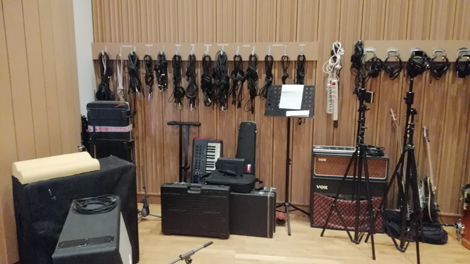
R!: – Going back in time again, did you have a home studio or something like that before starting Studio Fredman?
FN: Yes, I had a home studio.
R!: – Were you recording some stuff there like demos or something?
FN: Yeah, I was recording my own stuff and sometimes I used this 4-track cassette tape. So I was away with my neighbour and recorded his stuff and I used to go to people’s rehearsal rooms to record. Then we recorded a demo with my own band and went to this studio called Rainy Day. Then I did my military service and then I decided to have my own real studio, so I went to this guy and asked him if he wanted to become a partner and he said yes because he was on his way to quit the studio, so this was an opportunity to keep on going. That lasted for a year maybe, we were so different as persons, he was more like… hippie (laughs). You know? He was collecting stuff from trashcans and containers and bringing them to the studio and I was trying to build the studio to make it nicer and nicer. He went in the opposite direction. I mean, at one point we decided to reconstruct the studio and make it nicer and he never showed up, so I got very angry. It didn’t work.
Then there was this big crisis in the 90’s where the loan interest was up to 500% for a couple of weeks. It was totally crazy. He left the studio, took his gear, so I needed to buy a tape recorder, a mixing console, microphones and so on. I went to all the banks in Sweden and asked them if they could borrow 10.000 euros and they just looked at me and left. Nobody could loan any money because banks were on their way to be bankrupt. Then I had a friend of mine who was working on the board of a bank, so he solved my loan. That’s how I bought the gear and started building Studio Fredman.
R!: – You as well as the musicians were all very young back then. So how was that first experience working on an album? Were you nervous?
FN: No, not really. The first thing we recorded was something that my colleague brought in and that was two other hippies, totally crazy. We recorded that and then I think the second album was “Scandinavian Jawbreaker” by Anti Cimex. But they picked our studio because it was cheaper, so they could save more money to buy booze (laughs). When we were recording that album, Alf (Svensson) from At The Gates came into the studio and did a guest solo, and he was surprised that we were like so loose with everything. We were smoking and drinking coffee in the control room, laughing and having fun. They recorded “The Red In The Sky is Ours” album in another studio called ART which was very expensive and they were not allowed to do many things in the studio. In that way I got in contact with the underground death metal scene in Gothenburg.
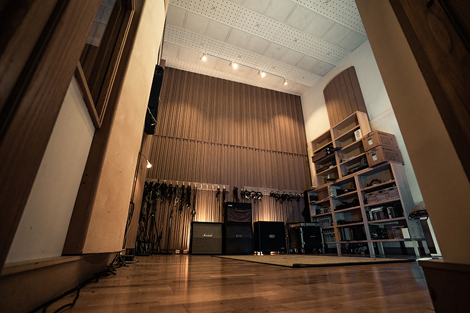
R!: – Did you have any kind of vision on how the bands should sound after those first albums?
FN: Not really. I was struggling to find a good sound because I was so unexperienced. Then local bands started to book me and got in touch with a record label here in Gothenburg that hired me for lots of recordings, so I was working twelve hours everyday seven days a week for several years to learn. I started to get better and better, then we did “Slaughter of the Soul” with At the Gates and I was going through a divorce, so I was so focused on that album. This was the first time that the band had a vision as well, they wanted to sound like a machine. The whole album was recorded without click track because he (Adrian Erlandsson) couldn’t play drums to click track, he learned later on. To sound like a machine, we need to record with click track, so we get perfect tempo. We tried but he didn’t manage, so we went with his tempo. It was hard work, but then I showed it to my pop friends and they were like “this sounds really good”. I think I was a total maniac, mixing that album for one week, using DAT tapes and going to stores to listen to it in different speakers all the time. At some point the owner of the store said “you have to stop now Fredrik, it sounds really good”. But you always come to a point where you say “I can improve this a bit more” and then you’re suddenly into stupid details and then crash.
R!: – But you’re satisfied with the result of the “Slaughter of the Soul” album, right?
FN: Yeah, yeah, but there’s always something you say “I could do that better” (laughs)
That was my first real big production, spent six weeks on that album which was not normally the case. Usually it was two weeks.
R!: – You’re also responsible for the production of the old school In Flames albums, so I wanted to discuss the “Whoracle” album in particular. Did the band have a vision of how they wanted to sound in this case? Was it a different approach in “Whoracle” compared to “The Jester’s Race”?
FN: No. I think during “Whoracle” was when I pushed them to take better photos and stuff like that. To be honest, In Flames were loose guys. They didn’t have their own backline or any amplifiers. They borrowed the uncle’s drums from the 60’s (laughs). I think it was on “Subterranean” or “Whoracle”, one of those albums, we almost didn’t manage to record it because this game “Tekken 3” came out and everybody went crazy, so they were playing video games for hours (laughs)
R!: – That’s how it was back then (laughs). Probably it’s a bit different when you see those guys now. Have you listened to their newer stuff?
FN: Not really. I’m sitting here all day working with music, so I don’t have a stereo at home. I listen to some radio in the car or if people send me demos. They did this 20th Anniversary thing with the “Colony” album…
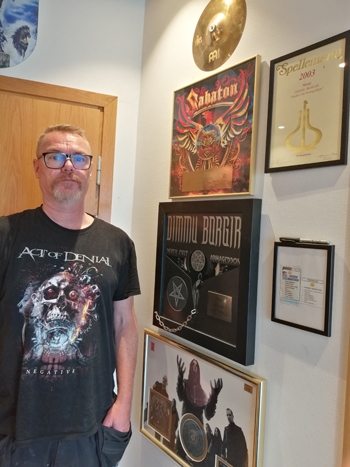
R!: – No, it was “Clayman” actually.
FN: Yeah, “Clayman”. There were lots of people contacting me to ask if I listened to it. I was expecting the worst since I got emails telling me all kinds of stuff about it, so I’ve listened to a couple of songs with different ears instead. I didn’t like the mix, but when it comes to Anders vocals, I think he improved a bit to be honest.
Now I have remixed the “Puritanical Euphoric Misanthropia” by Dimmu Borgir and I’m not sure if people are going to like it because I know that when it came out, many people thought it was a great sounding album. Also musicwise it’s a really good album, so for me it was a joy to bring it up again. Nick Barker played his drums and he refused to have anything less than 127 velocity which is the highest velocity you can have. Everything is in the highest velocity, so we took all the drums we recorded with microphones and we stored what he actually played, so it’s like the drums are back to the more dynamic thing and it’s more or less how the band wanted to have the sound. But I think I’m gonna get a lot of shit for that (laughs)
R!: – When it comes to the studio itself, it has been relocated a few times, right?
FN: Many times. This is the fifth location. The first place was very near the ocean with a really nice view over the Älvsborg bridge, but there was a judo club moving in on top of me, so there was noise all the time and I went to the landlord and said that I was not able to record there, and he said that the contract said it was a rehearsal room, not a recording studio. So I had to leave that place and build another one which was in a very old industrial building. I was on the fourth floor and there were no elevators, so taking up the material there was insane. Then the landlord said they wanted to have the building for offices. Then we took over a studio that was for sale which later on became IF Studio (In Flames Studio). I was living in the countryside at the time, so it was 50 km every morning driving to town and then back. This studio was 330 square meters in a very central location and I knew the rent was on its way up, so when the band wanted to buy the studio, I said yes.
R!: – So you had to relocate again…
FN: Yes, we moved to this place called Hyssna and I was there for a couple of years.
R!: – That’s a bit outside of the city, right?
FN: Yeah, countryside. Then we moved back to town again and I had to drive 50 km to Hyssna which was super boring, so I called a friend of mine that also worked playing keyboards on the In Flames albums, “Clayman” and “Colony”. So I called him up to tell him I was back in the city and he said he was sitting in the studio here, so I took a walk down here, came in and thought it was a really nice studio. He didn’t like this place because it was too much like a studio and he wanted to sit in his own apartment, but he couldn’t do that anymore because Bandidos have moved in as neighbours. One day when he went out, there was a guy coming in the stairs who had been stabbed with a knife several times, so there was blood everywhere and he died outside, so he was really scared. Another day there was a guy burning on the street.
R!: – What!?
FN: Yeah, but then the landlord kicked them out and he was on his way to move back to the apartment. So I bought this place from the original owner, I have not designed the studio. If I had done that, it would be different.
R!: – How long have you been in this location?
FN: Ten years I think. I recorded the Nicolas Cage’s son record here (the band is Eyes of Noctum). That was the first recording here.
R!: – Then it was 2008 or 2009.
FN: I still had the studio in Hyssna, but I rented the studio here at that time because I was like “I’m not gonna bring that guy out in the forest”. Weston Cage was a really nice guy, but the company around him was insane. I had a guy employed here, so I just placed him in Hyssna and sent him up there to record some vocals, bass and do some edits and stuff like that, so he didn’t have to be in the craziness that was here. After that I got rid of the studio in Hyssna and we moved here.
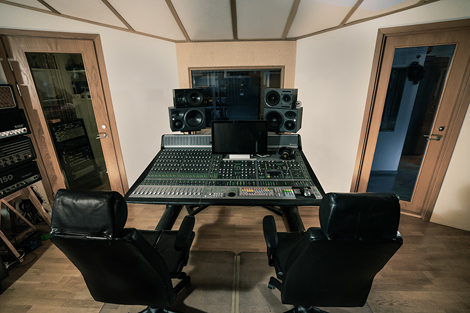
R!: – On this location you’ve been working with other bands with a more modern sound like Architects and Obscura which are of course different to what it used to be in the 90’s. What kind of challenges did you have to face with this new sound?
FN: Obscura for example, they were super nice guys, but I’ve never worked with such technical music before. It makes it hard, specially the snare drum. You have to adapt them to sound good when there are blast beats and stuff like that, but they also have to sound good when they play slow, so I think that’s the hardest part actually.
But take bands like Hammerfall for example, they get better and better, which means that also the songs get better. That also pushes me to do a better job. But yeah, the equipment and everything has changed. I always try to make the band sound like one unit, if you know what I mean, I don’t want to have the stuff too separated, but with the new digital gear is super hard. But then again there are many benefits and honestly I should never go back to a tape recorder again. Also, you do a mix and then you can close it and you can open it up again because the client wants to make some change and you do it. With analog gear, we mixed monday to friday, then you had the weekend to listen and if you wanted to change something, you had to do that before monday morning, otherwise the mix was gone.
R!: – Is there any band that you specially like to work with? I mean, that you find easy working with.
FN: Obscura was a band that was really easy to work with. Super professional guys. Michael Amott has always been easy to work with because he’s also a very professional guy.
It’s fun to work with Hammerfall because Oscar Dronjak is like a kid (laughs). He goes “ohhh this is gonna be so fun!” and I’m like “hey, we have done this for thirty years”. I really enjoy that he has that spirit, it’s admirable.
R!: – And is there any band that you would like to produce if there was a chance?
FN: I get this question many times (laughs). But there are so many good bands I work with. I was doing an interview with a magazine and they asked what’s the most important thing to have a successful recording and I said “to have fun”, because when you struggle and there are bad vibes… but take that legendary album, “Reign In Blood” by Slayer, it sounds kind of terrible, but it’s super aggressive and you get the whole feeling.
R!: – How do you manage when you have more than one task at the same time?
FN: When it comes to mixing, I usually book one week for that.
R!: – So you focus on one thing at a time.
FN: Yes, preferably. I try to organize it.
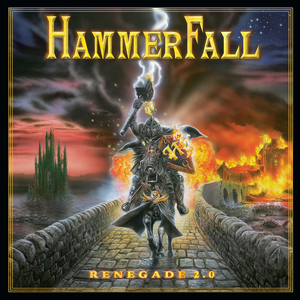
R!: – You’ve recently remixed the “Renegade” album by Hammerfall, how long did it take to do the job? Did you face any challenges in particular?
FN: Actually I’ve started to remix it several years ago, but I didn’t get it right. So I started again. It was actually me who insisted to remix the album because I remastered the “Glory to the Brave” and “Legacy of Kings” albums, and with “Renegade” it was the 20th Anniversary and I always said the album doesn’t sound good and Oscar didn’t agree with me because they paid so much money to record that album.
R!: They recorded it in USA, right?
FN: Yeah, so now he said that I could remix it. So I think it turned out really good. To be honest, there’s a lot of good songs on that album.
R!: – Let’s talk a bit about you as a musician now and your work with Dream Evil. Is it true that the band started when you and Gus G. met when you were on vacations in Greece or did you meet him before?
FN: I was on vacation to do a pre-production for a band called Exhumation and Gus was a friend of Marius (Iliopoulos, guitars), so he was hanging around all the time. Then we went back to Sweden to record that album and he followed. We did that album and I think Marius overdid the guitars and there were lots of fights in the band, but Gus had the plan to stay in Sweden and find a band, and I tried to help him with that. But nobody was interested then, so I told him that he could give guitar lessons to survive. We went to a music store in central Gothenburg and put ads saying guitar player educated in Berkley can give guitar lessons, but nobody called him. Then I told him I had started the studio to record my own album but nothing happened and I had some songs there. Then we started to make music and had a lot of fun together, this was in 1999 and the fun part is that some years later, in 2005, we went to the same music store and there was Gus guitar hanging.
R!: – Who came up with the name of the band?
FN: It was me. I never really listened to Dio, but somebody forgot a compilation CD in the studio, so I put it in and I was so amazed by his vocals. Great singer. So I was listening to that really loud in the studio while drinking wine. I had these massive speakers. I mean, it was loud. But yes, the idea for this band was actually to do just one album because the singer was actually doing backing vocals for Hammerfall and he’s really good. So I called him and asked him if he would like to sing in a demo and he said he could do it, but he didn’t want anything to do with record contracts or tours. So he came and he was singing for a couple of days and was like “this is really good stuff, I know a bass player”, so he called Peter (Stålfors). He just sat down and nailed all the songs in two hours, fucking good bass player. And then we started the band.
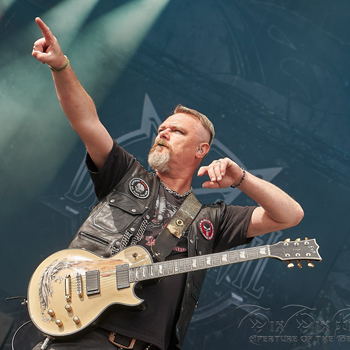
R!: – It was kind of an accident then (laughs)
FN: Yes, it was kind of an accident because we were planning to have some other singers like Mats Levén or something like that because he didn’t want to be in the band. And then we did the album without record contract. We started in December 1999 and we were done with the album in 2000, then we were going to sign a contract with Century Media and hired a lawyer because I knew it was very important to have a good lawyer to do your deals. He called me back saying they had agreed on 95% of everything, so we were gonna close the deal. Then Century Media changed all the policies of the contract for the worse and since we hadn’t signed it yet, they offered the new contract and the lawyer said no, so it took eight months to get a proper deal. That’s why the album was released in 2002.
R!: – I remember when it came out. 20 years already!
FN: The whole idea was to make it silly. It’s a concept album. It’s a mix between the movie Dragonheart and Cinderella. Everything is about that in that album. That’s why it’s called “DragonSlayer”.
The band’s name was going to be Dragonheart in the beginning, but there was three or four bands with the same name already.
R!: – Yeah, even Dragonforce was called DragonHeart before.
FN: Yes, so we had to change the name and then I was listening to that Dio album and went for Dream Evil.
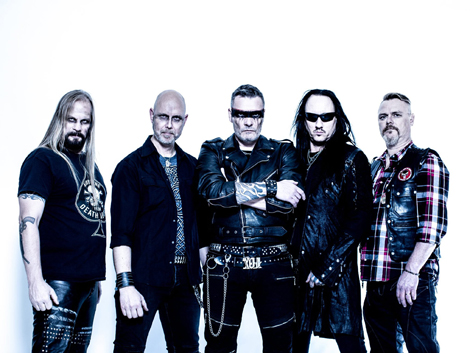
R!: – That one was not taken, so…
FN: I’m not super happy with the band name to be honest, but I was forced to come up with something fast. We played on a small stage at Sweden Rock festival, that was our second show, and then we got a phone call from a booking agency who wanted us to do a headline tour in Japan. So the third and fourth show were there. The thing is that I always wanted to go to Japan, so me and Gus, when we were writing the songs, when we met we were like “Hello Tokyo!”. Then we were standing in Tokyo and Gus came to me and said “Fredrik, who’s going to say Hello Tokyo”? And I said “well, that must be the lead singer” and he was like “Yeah, you’re right”, and then I went straight up on stage, took the microphone and screamed “Hello Tokyo!” and everybody started screaming and I heard Gus from the backstage screaming “fuck you!” (laughs)
R!: – That was really funny (laughs). Going back in time, when did you start playing guitar?
FN: I was a small kid. I’m left handed, so there was a TV program where you could learn how to play guitar, so I forced my mother to buy me a guitar when I was six because I had seen Jimi Hendrix and I was like “wow, I wanna play guitar”. I was always interested in instruments when I was a kid, but I didn’t know what to play, but when I saw the guitar it was like “that’s what I’m going to do”. So I was sitting there watching TV and trying to play the guitar and it sounded terrible because I was left-handed and I didn’t realize there were different strings, so he tuned the guitar and I tried the same but never got it to work. Then my mother put me in the guitar school and I was there for two years, and the teacher took the guitar and flipped it to the right side, so I learned three chords in two years because I was doing it wrong all the time. He finally got me to pick up the guitar the right way. Then my mother bought me an electric guitar which was 60 euros in a music store and it was connected to an old gramophone, so slowly I learned stuff. Then she bought me a Gibson guitar and then everything worked, that was a game-changing for me in my guitar playing.
R!: – Are you working on some new material with Dream Evil now or have you been mostly inactive lately?
FN: We had a writing session where we did two songs and then a show came up, so we had to start rehearsing for that show. We hadn’t played together for a long time, so there was a lot of rehearsal and now everybody’s on vacation and stuff like that. Then we will start writing music again. Let’s see how it goes because we’re so lazy, there are long periods between every album.
R!: – The last one was in 2017…
FN: Yeah, but that one was not a very good album, so we also have to make a good album, that we feel happy about it. The contract with the record label is running out because it’s been a long time, so if they’re not interested, we’re going to release it ourselves.
R!: – What album are you most proud to have produced?
FN: “Death Cult Armageddon” by Dimmu Borgir. That was a big moment. I think the previous one “Puritanical…” have better songs, but “Death Cult Armageddon” was a massive thing productionwise. We were sitting down in Prague with a full symphonic orchestra and the “Progenies of the Great Apocalypse” song coming out. In the studio when we recorded the guitar, it sounded boring, but then when we came down there and they started playing and we got goosebumps. Then we came back to the studio and everybody was so curious about how it was going to sound, so I played it for them and they were like “no”, so I spent a week editing to make it sound good.
R!: – It took quite some time to get there then…
FN: Yes, it took time to make the symphonic orchestra fit their music.
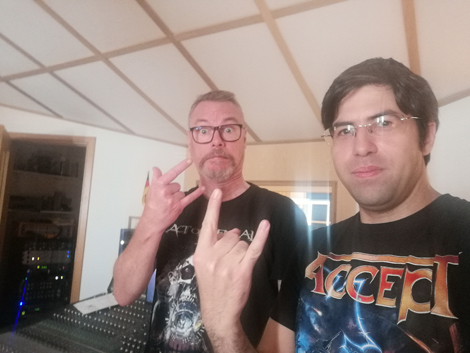
R!: – Ok, last one, what are your current projects as a producer?
FN: I’ve been working with this band Catalepsy and another one called Terminalcurse which has female vocals and it sounds a bit like At the Gates, really good. I just finished a project with a two-men punk/black metal band called Trespasser. It’s also a very good band. Then a South American band called Nothing Lies Above.
Right now there’s like a South American boom. I’m also going to mix the album of a band called Dragonheart in October.
R!: – Another one from South America!
FN: Yeah, but it goes in waves. I remember a few years ago there were many Australian bands working with me. The bad thing with South America is that the salaries there are lower than here, but we have very high taxes here, so when I tell them the price, they think it’s expensive.
R!: – So it’s hard to have an agreement.
FN: Yes, but I always try to figure something out to make it work for both. Also, with the experience I have, I can do stuff much faster. But anyway, to be honest I think I’m the cheapest one compared to my colleagues who are on the same level. You know? I didn’t start this to make money, so if I can pay my bills, I’m happy (laughs)



